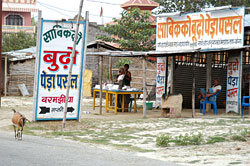 This Beed hit the road driving east and returned just as the unilateral
This Beed hit the road driving east and returned just as the unilateral
ceasefire ended. For the insulated inhabitants of the Kathmandu Valley, such a drive, especially for pleasure, is becoming rare.
Even during the just ended ceasefire, traffic volume was lower than five years back and one's aim was always clear-travel from one secure urban point to another. Checkpoints reflected the state of the nation, with confused looking security personnel who didn't seem to know what they were searching for. For the Nepal Tourism Board, which wants to promote domestic tourism, here is a clear message: no one wants to travel, the security points and the delays make it a nightmare. And if the journey to the east is so difficult, what must a trip to the west be like.
Nepal's strongest brand has always been the friendly smile, hospitality and warmth that Nepalis offered one another and visitors. The last 10 years of the 'people's war' have wiped out the people's smiles. Travellers and strangers are all regarded with suspicion, Nepalis don't trust fellow-Nepalis anymore. No more offering food or graciously receiving it. No more just talking for the sake of just talking.
Gone are the days of chatting about the wars that one's kith and kin fought for the British or the Indian Army. Today everyone talks about the last attack, the coming week-long banda, extortion or encounter. We still possess the art of storytelling but the stories are not happy ones anymore. The youth have a single agenda: get out of the country. If they can afford it, the US is the place to go, otherwise any place with a McDonalds will do.
Local business people no longer dream of growth but try to ensure that current volumes do not fall and have resorted to making some extra bucks whenever the supply chain is disrupted. Credit has been extended so bad debts have mounted. Locals worry that the banks, like the security stations, will shift from smaller villages to better protected areas in urban centres. Government services are in many places non-existent and even where they exist, only a few offices can actually deliver. The shutting down of 'projects' or reducing them to workshops in insulated hotel rooms has cut local spending. Construction remains the only visible growth industry, with migrants from 'affected areas' finding refuge and the lucky ones putting down roots in urban centres.
The economic cost of the insurgency is already incalculable and will only grow. We have yet to make an assessment of such losses, be they economic or the loss of key brand traits. The economic isolation of Kathmandu and the remittance bubble keeps our economy afloat but what we have lost can never be regained. We were an economy that could have grown eight percent annually, which means that in the past 10 years our GDP could have perhaps doubled.
But our approach of running the country from the nation-state of Kathmandu has made us myopic: we do not see what lies beyond the valley rim. The time has come for economists who write such impeccable funding proposals to tell the real story on the economy.
PIC: MIN BAJRACHAYRA



